Business Ethics: Socialism, Values, and Profitability Analysis
VerifiedAdded on 2022/08/12
|9
|2072
|15
Essay
AI Summary
This essay delves into the realm of business ethics, exploring the potential of socialism to foster a more just society and the role of business leaders within such a system. It examines the influence of good values on business profitability, acknowledging that certain ethical principles, while inherently positive, may inadvertently lead to negative financial outcomes. The essay analyzes specific examples of good values, such as professionalism and ethical codes of conduct, and explains how these values can sometimes create unintended consequences, such as decreased employee loyalty or compromised work efficiency, ultimately impacting the bottom line. The essay also discusses the impact of leadership qualities, such as motivational and inspirational skills, and how their misuse can distort organizational unity and negatively affect productivity. The analysis highlights the complexities of integrating ethical considerations into business practices and the need for a balanced approach that considers both the positive and potential negative impacts of good values.
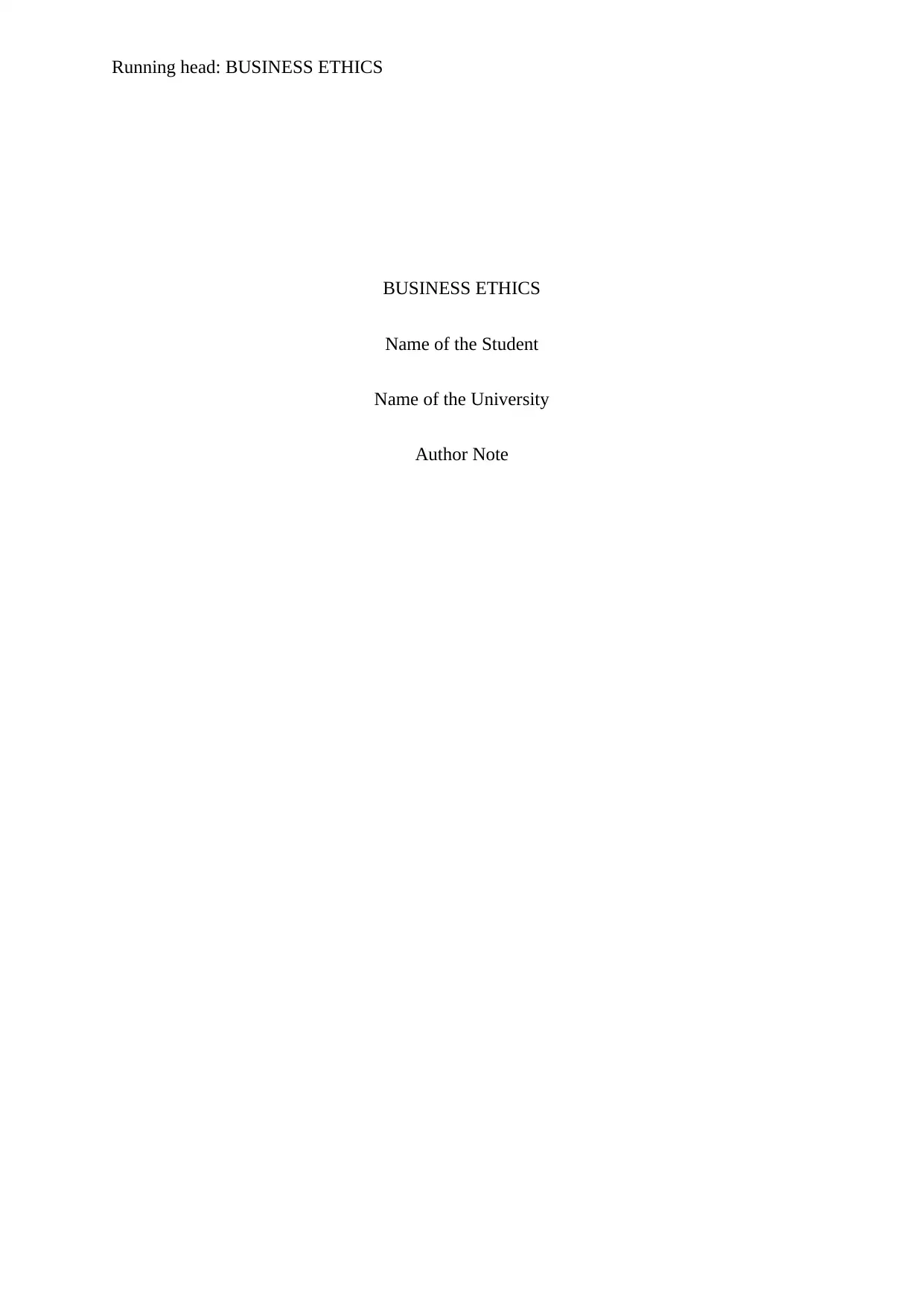
Running head: BUSINESS ETHICS
BUSINESS ETHICS
Name of the Student
Name of the University
Author Note
BUSINESS ETHICS
Name of the Student
Name of the University
Author Note
Paraphrase This Document
Need a fresh take? Get an instant paraphrase of this document with our AI Paraphraser
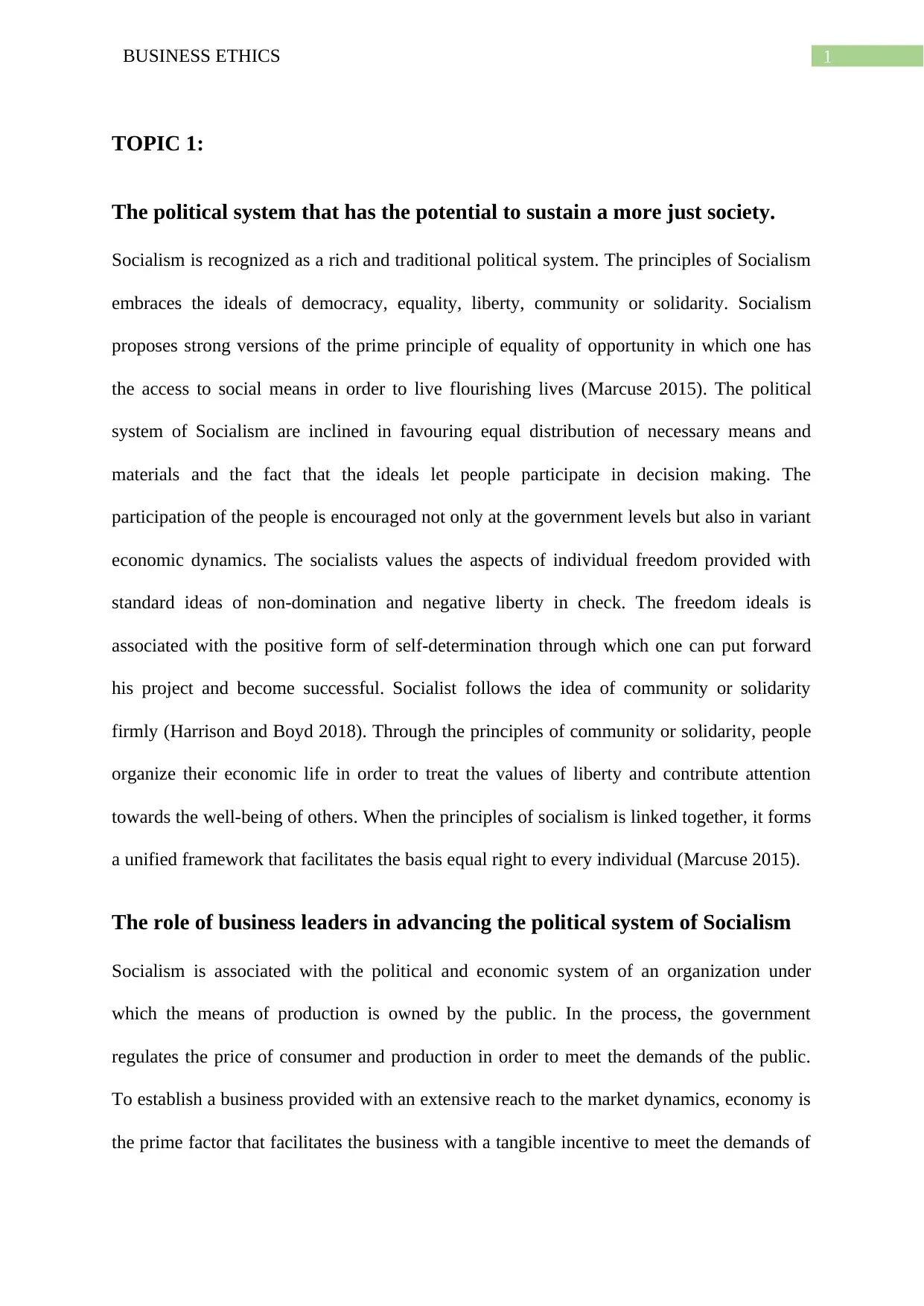
1BUSINESS ETHICS
TOPIC 1:
The political system that has the potential to sustain a more just society.
Socialism is recognized as a rich and traditional political system. The principles of Socialism
embraces the ideals of democracy, equality, liberty, community or solidarity. Socialism
proposes strong versions of the prime principle of equality of opportunity in which one has
the access to social means in order to live flourishing lives (Marcuse 2015). The political
system of Socialism are inclined in favouring equal distribution of necessary means and
materials and the fact that the ideals let people participate in decision making. The
participation of the people is encouraged not only at the government levels but also in variant
economic dynamics. The socialists values the aspects of individual freedom provided with
standard ideas of non-domination and negative liberty in check. The freedom ideals is
associated with the positive form of self-determination through which one can put forward
his project and become successful. Socialist follows the idea of community or solidarity
firmly (Harrison and Boyd 2018). Through the principles of community or solidarity, people
organize their economic life in order to treat the values of liberty and contribute attention
towards the well-being of others. When the principles of socialism is linked together, it forms
a unified framework that facilitates the basis equal right to every individual (Marcuse 2015).
The role of business leaders in advancing the political system of Socialism
Socialism is associated with the political and economic system of an organization under
which the means of production is owned by the public. In the process, the government
regulates the price of consumer and production in order to meet the demands of the public.
To establish a business provided with an extensive reach to the market dynamics, economy is
the prime factor that facilitates the business with a tangible incentive to meet the demands of
TOPIC 1:
The political system that has the potential to sustain a more just society.
Socialism is recognized as a rich and traditional political system. The principles of Socialism
embraces the ideals of democracy, equality, liberty, community or solidarity. Socialism
proposes strong versions of the prime principle of equality of opportunity in which one has
the access to social means in order to live flourishing lives (Marcuse 2015). The political
system of Socialism are inclined in favouring equal distribution of necessary means and
materials and the fact that the ideals let people participate in decision making. The
participation of the people is encouraged not only at the government levels but also in variant
economic dynamics. The socialists values the aspects of individual freedom provided with
standard ideas of non-domination and negative liberty in check. The freedom ideals is
associated with the positive form of self-determination through which one can put forward
his project and become successful. Socialist follows the idea of community or solidarity
firmly (Harrison and Boyd 2018). Through the principles of community or solidarity, people
organize their economic life in order to treat the values of liberty and contribute attention
towards the well-being of others. When the principles of socialism is linked together, it forms
a unified framework that facilitates the basis equal right to every individual (Marcuse 2015).
The role of business leaders in advancing the political system of Socialism
Socialism is associated with the political and economic system of an organization under
which the means of production is owned by the public. In the process, the government
regulates the price of consumer and production in order to meet the demands of the public.
To establish a business provided with an extensive reach to the market dynamics, economy is
the prime factor that facilitates the business with a tangible incentive to meet the demands of
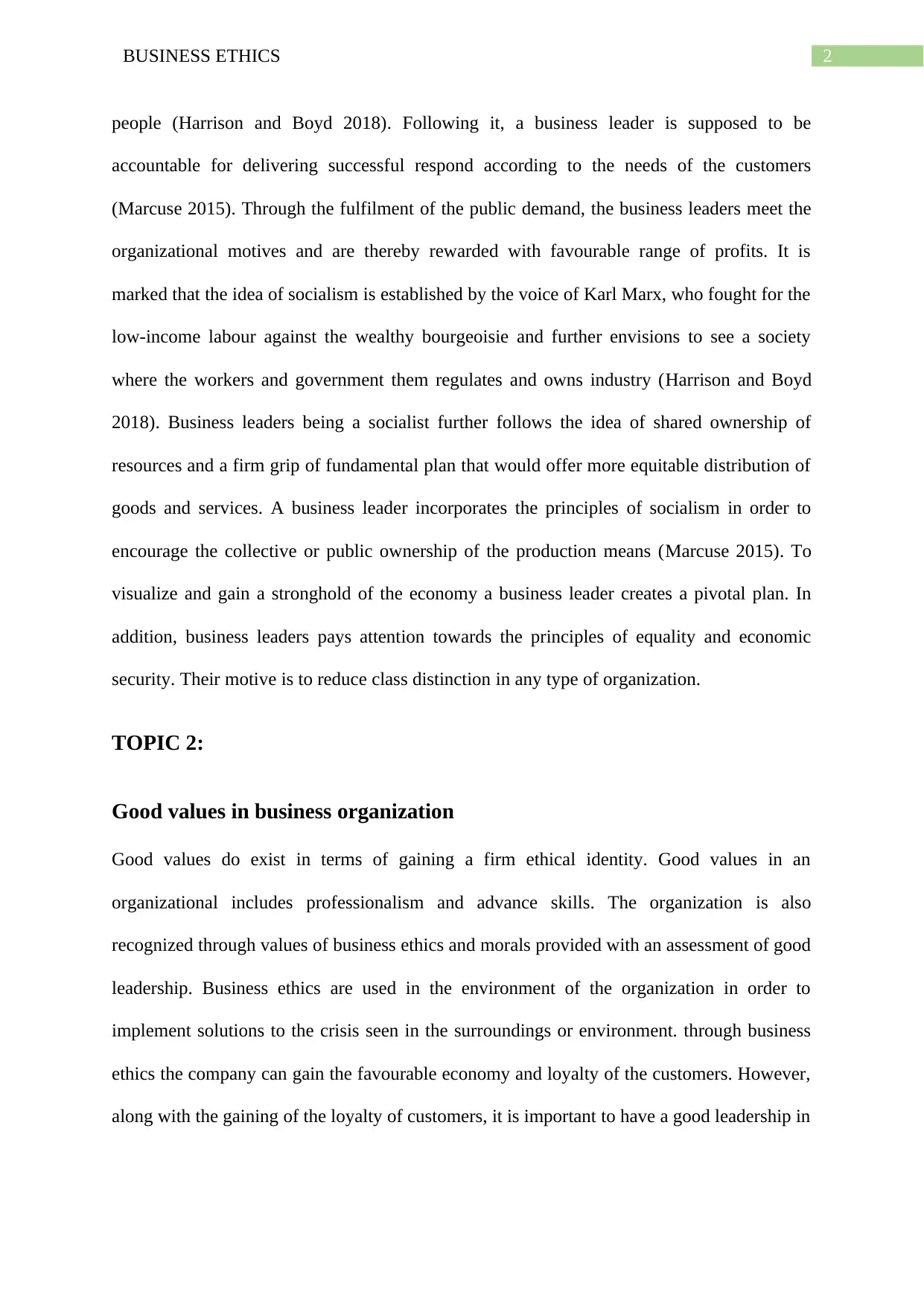
2BUSINESS ETHICS
people (Harrison and Boyd 2018). Following it, a business leader is supposed to be
accountable for delivering successful respond according to the needs of the customers
(Marcuse 2015). Through the fulfilment of the public demand, the business leaders meet the
organizational motives and are thereby rewarded with favourable range of profits. It is
marked that the idea of socialism is established by the voice of Karl Marx, who fought for the
low-income labour against the wealthy bourgeoisie and further envisions to see a society
where the workers and government them regulates and owns industry (Harrison and Boyd
2018). Business leaders being a socialist further follows the idea of shared ownership of
resources and a firm grip of fundamental plan that would offer more equitable distribution of
goods and services. A business leader incorporates the principles of socialism in order to
encourage the collective or public ownership of the production means (Marcuse 2015). To
visualize and gain a stronghold of the economy a business leader creates a pivotal plan. In
addition, business leaders pays attention towards the principles of equality and economic
security. Their motive is to reduce class distinction in any type of organization.
TOPIC 2:
Good values in business organization
Good values do exist in terms of gaining a firm ethical identity. Good values in an
organizational includes professionalism and advance skills. The organization is also
recognized through values of business ethics and morals provided with an assessment of good
leadership. Business ethics are used in the environment of the organization in order to
implement solutions to the crisis seen in the surroundings or environment. through business
ethics the company can gain the favourable economy and loyalty of the customers. However,
along with the gaining of the loyalty of customers, it is important to have a good leadership in
people (Harrison and Boyd 2018). Following it, a business leader is supposed to be
accountable for delivering successful respond according to the needs of the customers
(Marcuse 2015). Through the fulfilment of the public demand, the business leaders meet the
organizational motives and are thereby rewarded with favourable range of profits. It is
marked that the idea of socialism is established by the voice of Karl Marx, who fought for the
low-income labour against the wealthy bourgeoisie and further envisions to see a society
where the workers and government them regulates and owns industry (Harrison and Boyd
2018). Business leaders being a socialist further follows the idea of shared ownership of
resources and a firm grip of fundamental plan that would offer more equitable distribution of
goods and services. A business leader incorporates the principles of socialism in order to
encourage the collective or public ownership of the production means (Marcuse 2015). To
visualize and gain a stronghold of the economy a business leader creates a pivotal plan. In
addition, business leaders pays attention towards the principles of equality and economic
security. Their motive is to reduce class distinction in any type of organization.
TOPIC 2:
Good values in business organization
Good values do exist in terms of gaining a firm ethical identity. Good values in an
organizational includes professionalism and advance skills. The organization is also
recognized through values of business ethics and morals provided with an assessment of good
leadership. Business ethics are used in the environment of the organization in order to
implement solutions to the crisis seen in the surroundings or environment. through business
ethics the company can gain the favourable economy and loyalty of the customers. However,
along with the gaining of the loyalty of customers, it is important to have a good leadership in
⊘ This is a preview!⊘
Do you want full access?
Subscribe today to unlock all pages.

Trusted by 1+ million students worldwide
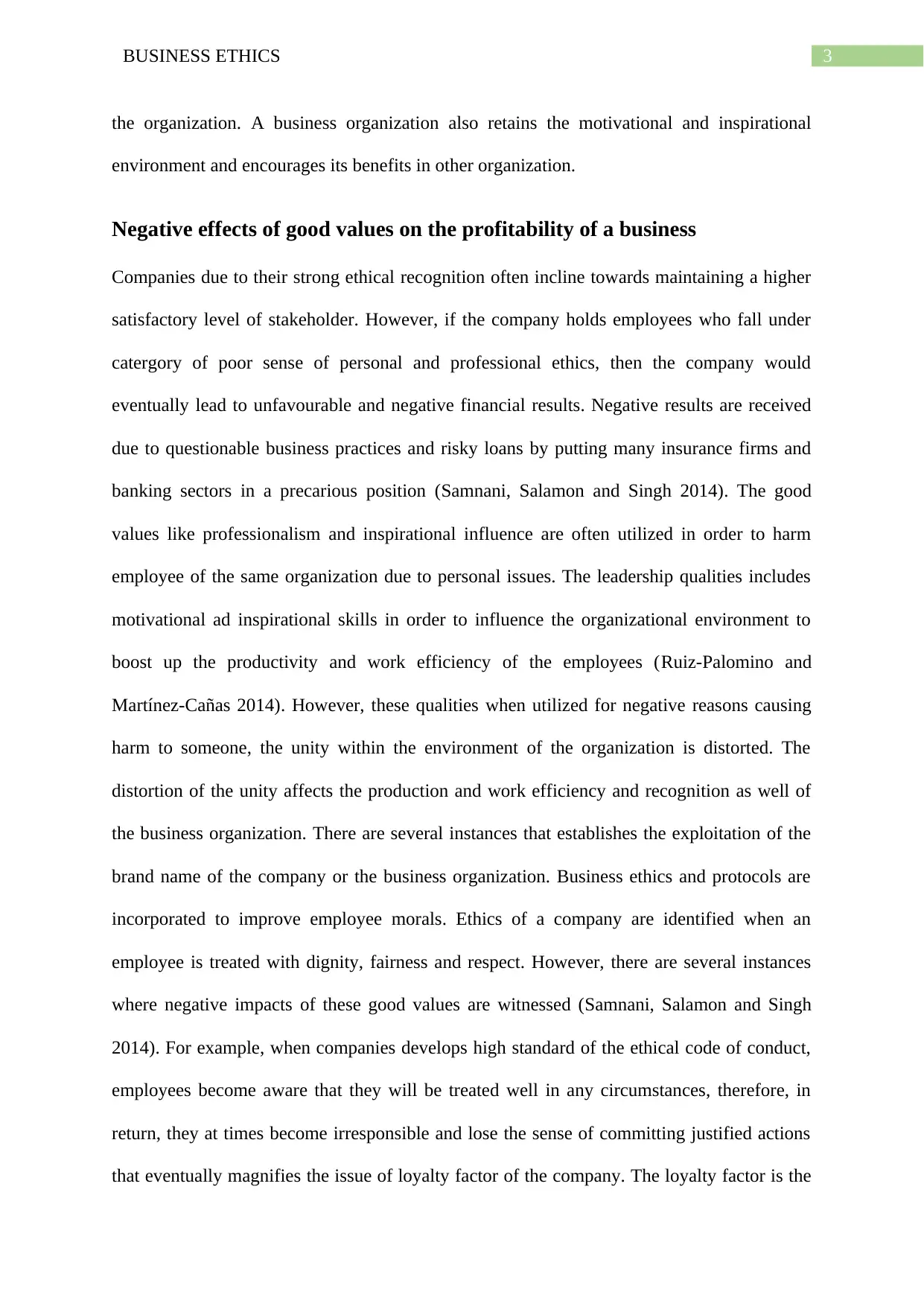
3BUSINESS ETHICS
the organization. A business organization also retains the motivational and inspirational
environment and encourages its benefits in other organization.
Negative effects of good values on the profitability of a business
Companies due to their strong ethical recognition often incline towards maintaining a higher
satisfactory level of stakeholder. However, if the company holds employees who fall under
catergory of poor sense of personal and professional ethics, then the company would
eventually lead to unfavourable and negative financial results. Negative results are received
due to questionable business practices and risky loans by putting many insurance firms and
banking sectors in a precarious position (Samnani, Salamon and Singh 2014). The good
values like professionalism and inspirational influence are often utilized in order to harm
employee of the same organization due to personal issues. The leadership qualities includes
motivational ad inspirational skills in order to influence the organizational environment to
boost up the productivity and work efficiency of the employees (Ruiz-Palomino and
Martínez-Cañas 2014). However, these qualities when utilized for negative reasons causing
harm to someone, the unity within the environment of the organization is distorted. The
distortion of the unity affects the production and work efficiency and recognition as well of
the business organization. There are several instances that establishes the exploitation of the
brand name of the company or the business organization. Business ethics and protocols are
incorporated to improve employee morals. Ethics of a company are identified when an
employee is treated with dignity, fairness and respect. However, there are several instances
where negative impacts of these good values are witnessed (Samnani, Salamon and Singh
2014). For example, when companies develops high standard of the ethical code of conduct,
employees become aware that they will be treated well in any circumstances, therefore, in
return, they at times become irresponsible and lose the sense of committing justified actions
that eventually magnifies the issue of loyalty factor of the company. The loyalty factor is the
the organization. A business organization also retains the motivational and inspirational
environment and encourages its benefits in other organization.
Negative effects of good values on the profitability of a business
Companies due to their strong ethical recognition often incline towards maintaining a higher
satisfactory level of stakeholder. However, if the company holds employees who fall under
catergory of poor sense of personal and professional ethics, then the company would
eventually lead to unfavourable and negative financial results. Negative results are received
due to questionable business practices and risky loans by putting many insurance firms and
banking sectors in a precarious position (Samnani, Salamon and Singh 2014). The good
values like professionalism and inspirational influence are often utilized in order to harm
employee of the same organization due to personal issues. The leadership qualities includes
motivational ad inspirational skills in order to influence the organizational environment to
boost up the productivity and work efficiency of the employees (Ruiz-Palomino and
Martínez-Cañas 2014). However, these qualities when utilized for negative reasons causing
harm to someone, the unity within the environment of the organization is distorted. The
distortion of the unity affects the production and work efficiency and recognition as well of
the business organization. There are several instances that establishes the exploitation of the
brand name of the company or the business organization. Business ethics and protocols are
incorporated to improve employee morals. Ethics of a company are identified when an
employee is treated with dignity, fairness and respect. However, there are several instances
where negative impacts of these good values are witnessed (Samnani, Salamon and Singh
2014). For example, when companies develops high standard of the ethical code of conduct,
employees become aware that they will be treated well in any circumstances, therefore, in
return, they at times become irresponsible and lose the sense of committing justified actions
that eventually magnifies the issue of loyalty factor of the company. The loyalty factor is the
Paraphrase This Document
Need a fresh take? Get an instant paraphrase of this document with our AI Paraphraser
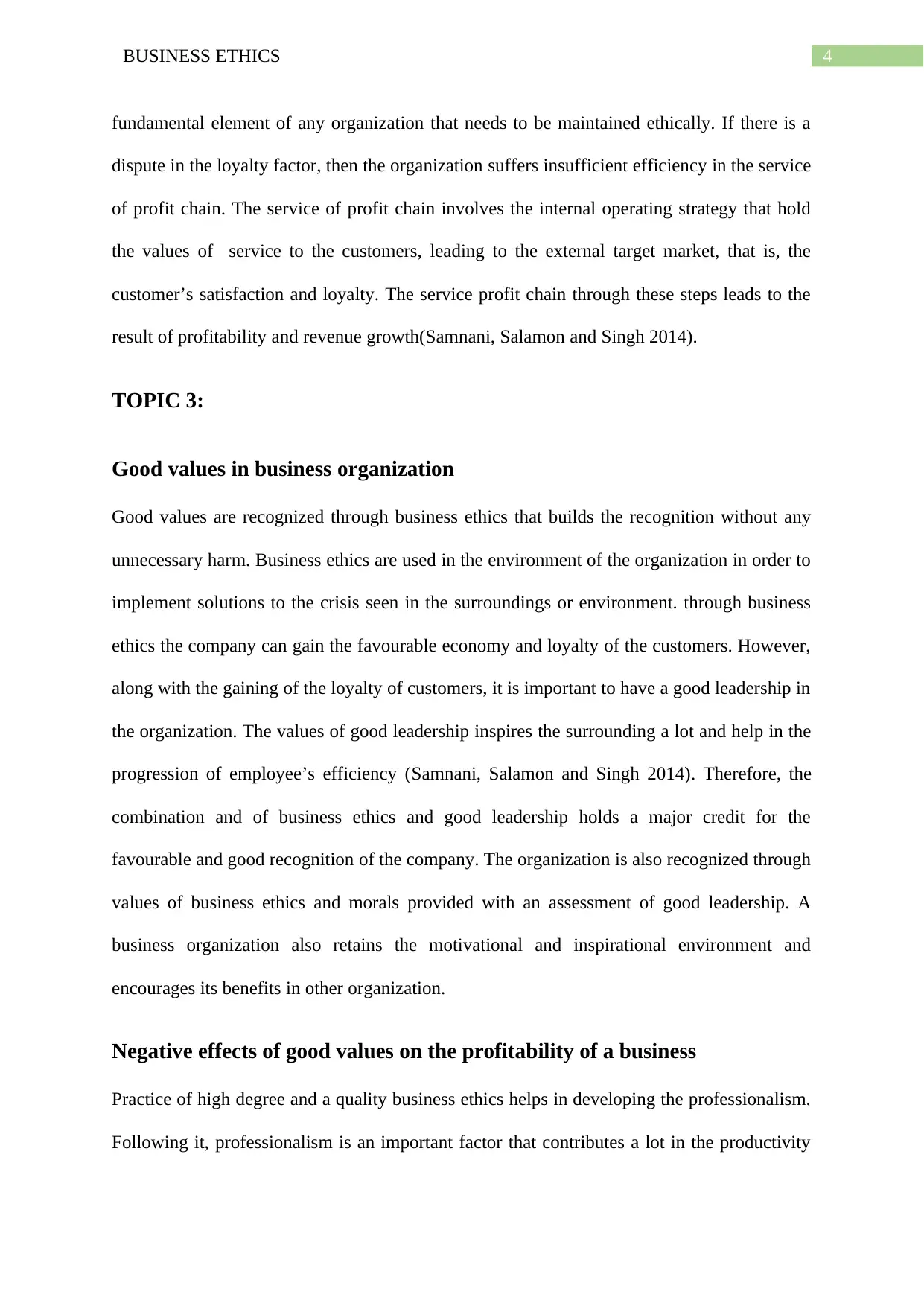
4BUSINESS ETHICS
fundamental element of any organization that needs to be maintained ethically. If there is a
dispute in the loyalty factor, then the organization suffers insufficient efficiency in the service
of profit chain. The service of profit chain involves the internal operating strategy that hold
the values of service to the customers, leading to the external target market, that is, the
customer’s satisfaction and loyalty. The service profit chain through these steps leads to the
result of profitability and revenue growth(Samnani, Salamon and Singh 2014).
TOPIC 3:
Good values in business organization
Good values are recognized through business ethics that builds the recognition without any
unnecessary harm. Business ethics are used in the environment of the organization in order to
implement solutions to the crisis seen in the surroundings or environment. through business
ethics the company can gain the favourable economy and loyalty of the customers. However,
along with the gaining of the loyalty of customers, it is important to have a good leadership in
the organization. The values of good leadership inspires the surrounding a lot and help in the
progression of employee’s efficiency (Samnani, Salamon and Singh 2014). Therefore, the
combination and of business ethics and good leadership holds a major credit for the
favourable and good recognition of the company. The organization is also recognized through
values of business ethics and morals provided with an assessment of good leadership. A
business organization also retains the motivational and inspirational environment and
encourages its benefits in other organization.
Negative effects of good values on the profitability of a business
Practice of high degree and a quality business ethics helps in developing the professionalism.
Following it, professionalism is an important factor that contributes a lot in the productivity
fundamental element of any organization that needs to be maintained ethically. If there is a
dispute in the loyalty factor, then the organization suffers insufficient efficiency in the service
of profit chain. The service of profit chain involves the internal operating strategy that hold
the values of service to the customers, leading to the external target market, that is, the
customer’s satisfaction and loyalty. The service profit chain through these steps leads to the
result of profitability and revenue growth(Samnani, Salamon and Singh 2014).
TOPIC 3:
Good values in business organization
Good values are recognized through business ethics that builds the recognition without any
unnecessary harm. Business ethics are used in the environment of the organization in order to
implement solutions to the crisis seen in the surroundings or environment. through business
ethics the company can gain the favourable economy and loyalty of the customers. However,
along with the gaining of the loyalty of customers, it is important to have a good leadership in
the organization. The values of good leadership inspires the surrounding a lot and help in the
progression of employee’s efficiency (Samnani, Salamon and Singh 2014). Therefore, the
combination and of business ethics and good leadership holds a major credit for the
favourable and good recognition of the company. The organization is also recognized through
values of business ethics and morals provided with an assessment of good leadership. A
business organization also retains the motivational and inspirational environment and
encourages its benefits in other organization.
Negative effects of good values on the profitability of a business
Practice of high degree and a quality business ethics helps in developing the professionalism.
Following it, professionalism is an important factor that contributes a lot in the productivity
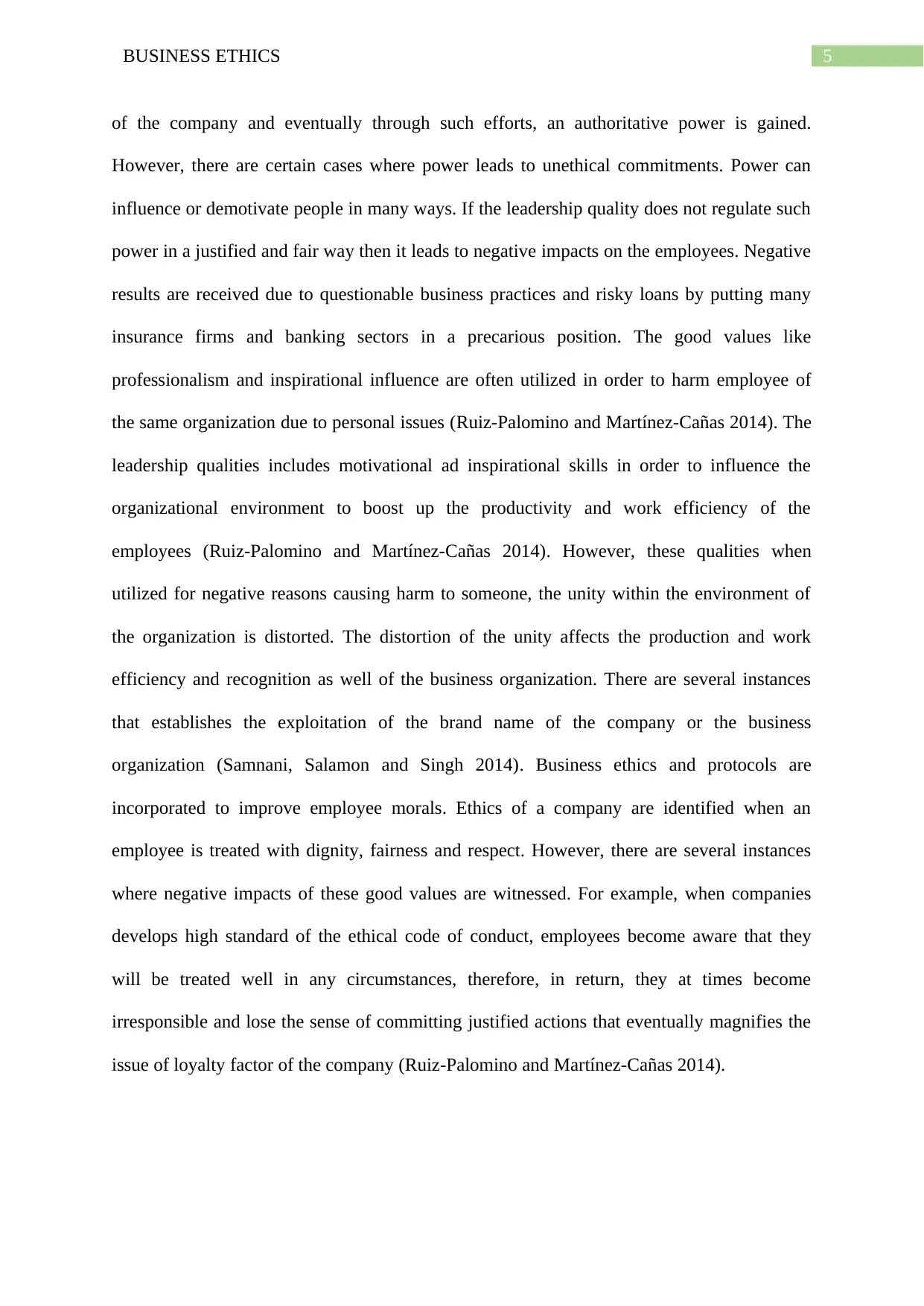
5BUSINESS ETHICS
of the company and eventually through such efforts, an authoritative power is gained.
However, there are certain cases where power leads to unethical commitments. Power can
influence or demotivate people in many ways. If the leadership quality does not regulate such
power in a justified and fair way then it leads to negative impacts on the employees. Negative
results are received due to questionable business practices and risky loans by putting many
insurance firms and banking sectors in a precarious position. The good values like
professionalism and inspirational influence are often utilized in order to harm employee of
the same organization due to personal issues (Ruiz-Palomino and Martínez-Cañas 2014). The
leadership qualities includes motivational ad inspirational skills in order to influence the
organizational environment to boost up the productivity and work efficiency of the
employees (Ruiz-Palomino and Martínez-Cañas 2014). However, these qualities when
utilized for negative reasons causing harm to someone, the unity within the environment of
the organization is distorted. The distortion of the unity affects the production and work
efficiency and recognition as well of the business organization. There are several instances
that establishes the exploitation of the brand name of the company or the business
organization (Samnani, Salamon and Singh 2014). Business ethics and protocols are
incorporated to improve employee morals. Ethics of a company are identified when an
employee is treated with dignity, fairness and respect. However, there are several instances
where negative impacts of these good values are witnessed. For example, when companies
develops high standard of the ethical code of conduct, employees become aware that they
will be treated well in any circumstances, therefore, in return, they at times become
irresponsible and lose the sense of committing justified actions that eventually magnifies the
issue of loyalty factor of the company (Ruiz-Palomino and Martínez-Cañas 2014).
of the company and eventually through such efforts, an authoritative power is gained.
However, there are certain cases where power leads to unethical commitments. Power can
influence or demotivate people in many ways. If the leadership quality does not regulate such
power in a justified and fair way then it leads to negative impacts on the employees. Negative
results are received due to questionable business practices and risky loans by putting many
insurance firms and banking sectors in a precarious position. The good values like
professionalism and inspirational influence are often utilized in order to harm employee of
the same organization due to personal issues (Ruiz-Palomino and Martínez-Cañas 2014). The
leadership qualities includes motivational ad inspirational skills in order to influence the
organizational environment to boost up the productivity and work efficiency of the
employees (Ruiz-Palomino and Martínez-Cañas 2014). However, these qualities when
utilized for negative reasons causing harm to someone, the unity within the environment of
the organization is distorted. The distortion of the unity affects the production and work
efficiency and recognition as well of the business organization. There are several instances
that establishes the exploitation of the brand name of the company or the business
organization (Samnani, Salamon and Singh 2014). Business ethics and protocols are
incorporated to improve employee morals. Ethics of a company are identified when an
employee is treated with dignity, fairness and respect. However, there are several instances
where negative impacts of these good values are witnessed. For example, when companies
develops high standard of the ethical code of conduct, employees become aware that they
will be treated well in any circumstances, therefore, in return, they at times become
irresponsible and lose the sense of committing justified actions that eventually magnifies the
issue of loyalty factor of the company (Ruiz-Palomino and Martínez-Cañas 2014).
⊘ This is a preview!⊘
Do you want full access?
Subscribe today to unlock all pages.

Trusted by 1+ million students worldwide

6BUSINESS ETHICS
Paraphrase This Document
Need a fresh take? Get an instant paraphrase of this document with our AI Paraphraser
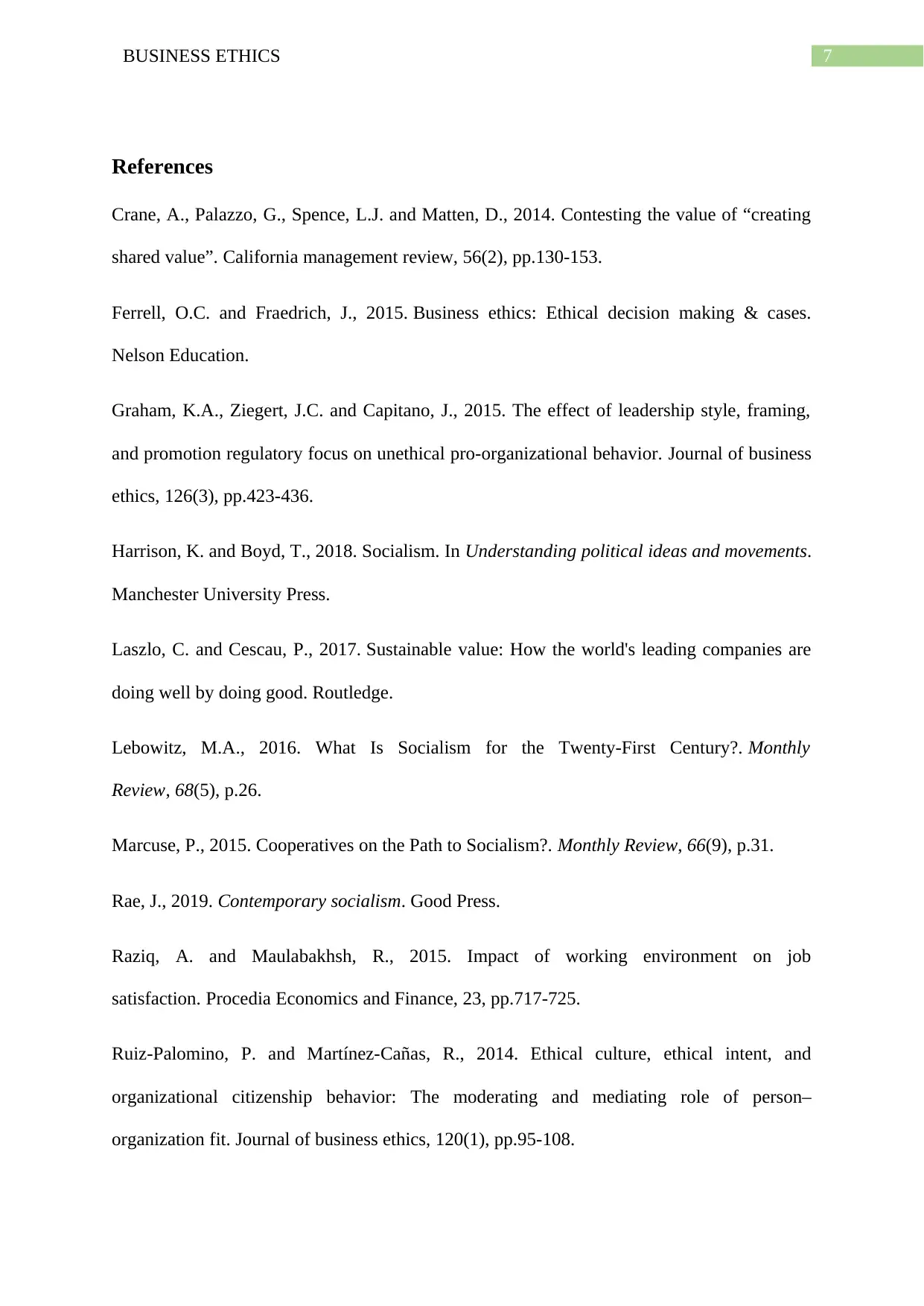
7BUSINESS ETHICS
References
Crane, A., Palazzo, G., Spence, L.J. and Matten, D., 2014. Contesting the value of “creating
shared value”. California management review, 56(2), pp.130-153.
Ferrell, O.C. and Fraedrich, J., 2015. Business ethics: Ethical decision making & cases.
Nelson Education.
Graham, K.A., Ziegert, J.C. and Capitano, J., 2015. The effect of leadership style, framing,
and promotion regulatory focus on unethical pro-organizational behavior. Journal of business
ethics, 126(3), pp.423-436.
Harrison, K. and Boyd, T., 2018. Socialism. In Understanding political ideas and movements.
Manchester University Press.
Laszlo, C. and Cescau, P., 2017. Sustainable value: How the world's leading companies are
doing well by doing good. Routledge.
Lebowitz, M.A., 2016. What Is Socialism for the Twenty-First Century?. Monthly
Review, 68(5), p.26.
Marcuse, P., 2015. Cooperatives on the Path to Socialism?. Monthly Review, 66(9), p.31.
Rae, J., 2019. Contemporary socialism. Good Press.
Raziq, A. and Maulabakhsh, R., 2015. Impact of working environment on job
satisfaction. Procedia Economics and Finance, 23, pp.717-725.
Ruiz-Palomino, P. and Martínez-Cañas, R., 2014. Ethical culture, ethical intent, and
organizational citizenship behavior: The moderating and mediating role of person–
organization fit. Journal of business ethics, 120(1), pp.95-108.
References
Crane, A., Palazzo, G., Spence, L.J. and Matten, D., 2014. Contesting the value of “creating
shared value”. California management review, 56(2), pp.130-153.
Ferrell, O.C. and Fraedrich, J., 2015. Business ethics: Ethical decision making & cases.
Nelson Education.
Graham, K.A., Ziegert, J.C. and Capitano, J., 2015. The effect of leadership style, framing,
and promotion regulatory focus on unethical pro-organizational behavior. Journal of business
ethics, 126(3), pp.423-436.
Harrison, K. and Boyd, T., 2018. Socialism. In Understanding political ideas and movements.
Manchester University Press.
Laszlo, C. and Cescau, P., 2017. Sustainable value: How the world's leading companies are
doing well by doing good. Routledge.
Lebowitz, M.A., 2016. What Is Socialism for the Twenty-First Century?. Monthly
Review, 68(5), p.26.
Marcuse, P., 2015. Cooperatives on the Path to Socialism?. Monthly Review, 66(9), p.31.
Rae, J., 2019. Contemporary socialism. Good Press.
Raziq, A. and Maulabakhsh, R., 2015. Impact of working environment on job
satisfaction. Procedia Economics and Finance, 23, pp.717-725.
Ruiz-Palomino, P. and Martínez-Cañas, R., 2014. Ethical culture, ethical intent, and
organizational citizenship behavior: The moderating and mediating role of person–
organization fit. Journal of business ethics, 120(1), pp.95-108.
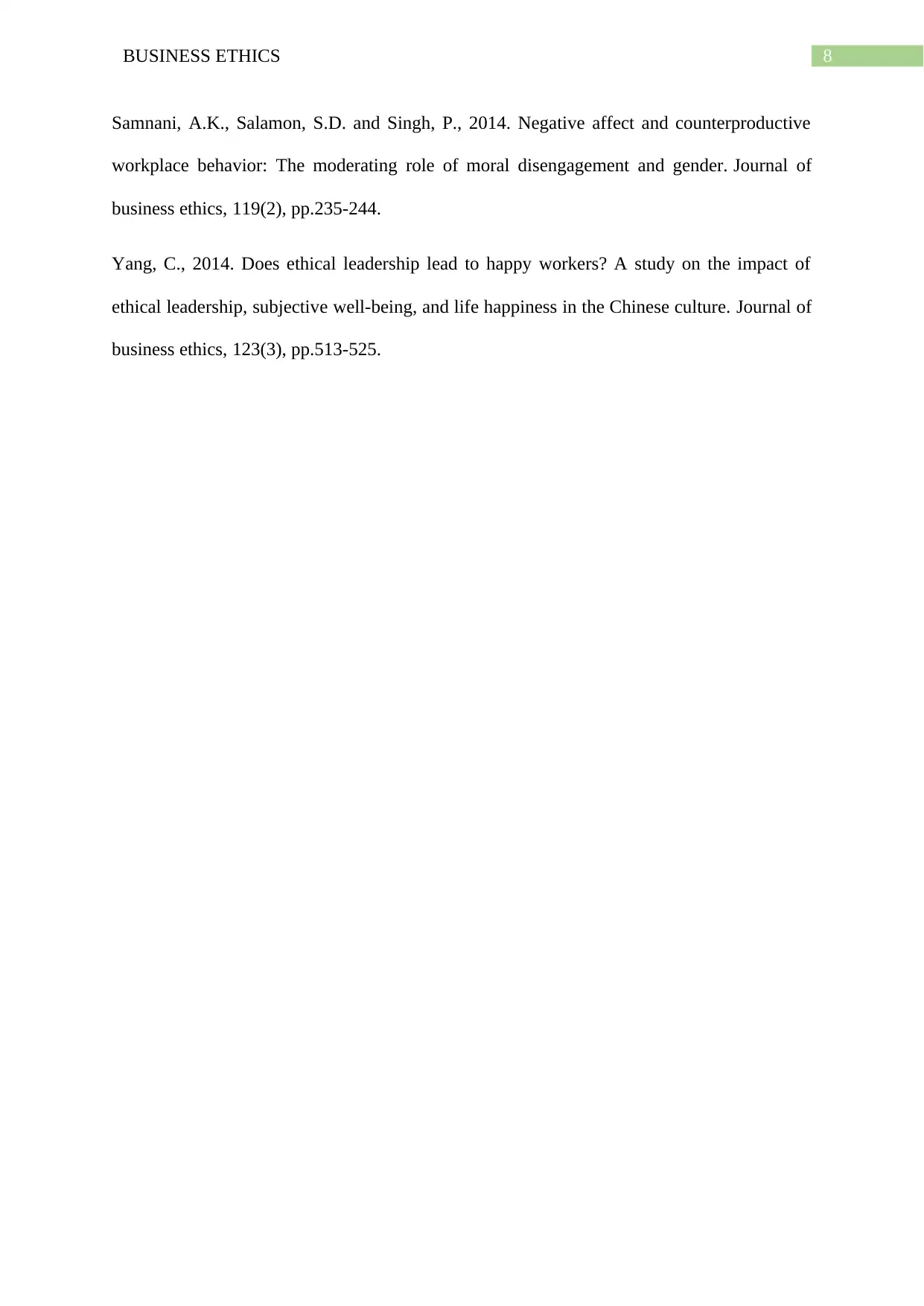
8BUSINESS ETHICS
Samnani, A.K., Salamon, S.D. and Singh, P., 2014. Negative affect and counterproductive
workplace behavior: The moderating role of moral disengagement and gender. Journal of
business ethics, 119(2), pp.235-244.
Yang, C., 2014. Does ethical leadership lead to happy workers? A study on the impact of
ethical leadership, subjective well-being, and life happiness in the Chinese culture. Journal of
business ethics, 123(3), pp.513-525.
Samnani, A.K., Salamon, S.D. and Singh, P., 2014. Negative affect and counterproductive
workplace behavior: The moderating role of moral disengagement and gender. Journal of
business ethics, 119(2), pp.235-244.
Yang, C., 2014. Does ethical leadership lead to happy workers? A study on the impact of
ethical leadership, subjective well-being, and life happiness in the Chinese culture. Journal of
business ethics, 123(3), pp.513-525.
⊘ This is a preview!⊘
Do you want full access?
Subscribe today to unlock all pages.

Trusted by 1+ million students worldwide
1 out of 9
Your All-in-One AI-Powered Toolkit for Academic Success.
+13062052269
info@desklib.com
Available 24*7 on WhatsApp / Email
![[object Object]](/_next/static/media/star-bottom.7253800d.svg)
Unlock your academic potential
Copyright © 2020–2026 A2Z Services. All Rights Reserved. Developed and managed by ZUCOL.
